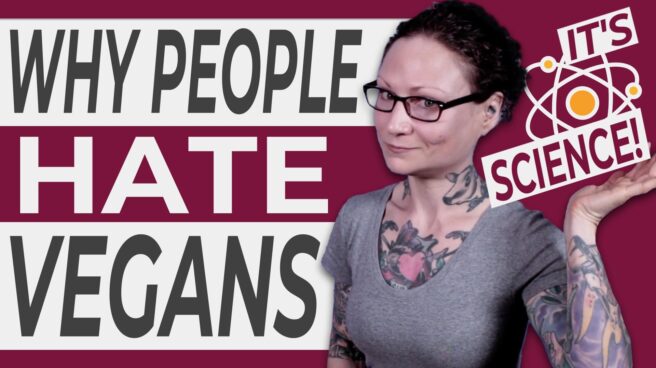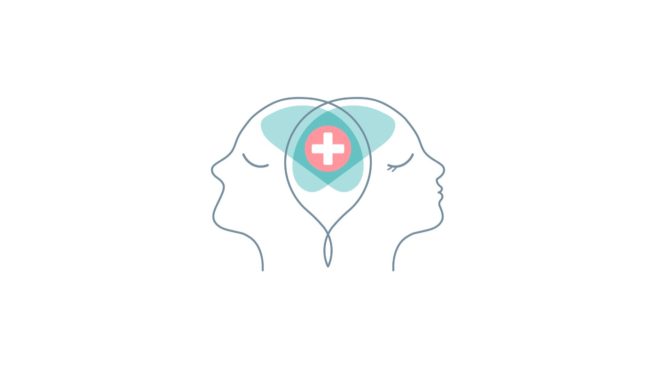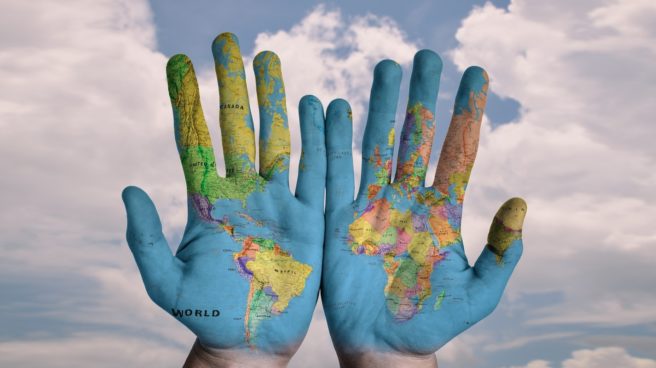Despite (and, in many ways, because of) the stereotype that “vegans talk about veganism all the time,” many—if not most—vegans actually won’t talk about veganism. In fact, many vegans won’t disclose that they’re vegan at all.
This article and video explore some of the reasons vegans hide their veganism, offering a look at the other side of vegan stigma, stereotypes, and anti-vegan bias. (And how exhausting it is to be openly vegan!)
But vegans aren’t the only people impacted—we also cover how vegan “self-silencing” (and its causes) harms all of us. Finally, we explore potential solutions that may be surprising—like the need to move towards a world without vegans.
You may have heard some variation of the joke “How do you know someone’s vegan? Don’t worry, they’ll tell you!” Ironically, this joke captures one of the reasons many—if not most—vegans actually won’t tell you they’re vegan. In fact, many vegans put great effort into not talking about veganism at all! tweet this
In this article and video, we’re not only going to look into some of the reasons vegans hide their veganism, but also how this self-silencing—and its causes—harms all of us—vegan or not. And the potential solutions may not be what you’d expect. Essentially, we need to evolve towards a world without vegans.
(Some of) the Many Reasons Vegans Hide Their Veganism
There are many reasons vegans hide their veganism, with diverse, complex, and even conflicting motivations and concerns. While I won’t be able to speak to every individual vegan’s experience, we’ll be exploring common pressures vegans face.
Vegan self-silencing is often motivated by experiences of being “othered,”<strong>+</strong>1 yet many of the reasons vegans hide their veganism spring from human needs and desires we all share. And all of those needs can be placed in jeopardy when people learn you’re vegan.
While the first few sections we’ll cover may sound like a commercial for why you should never consider moving away from eating animals, there’s evidence things may be changing. But before we can speak to the solutions and signs of hope, we need to understand the real fears vegans have of disclosing their veganism.
Vegans Can Get a Lot of Hate (Understanding the Fear of Disclosure)
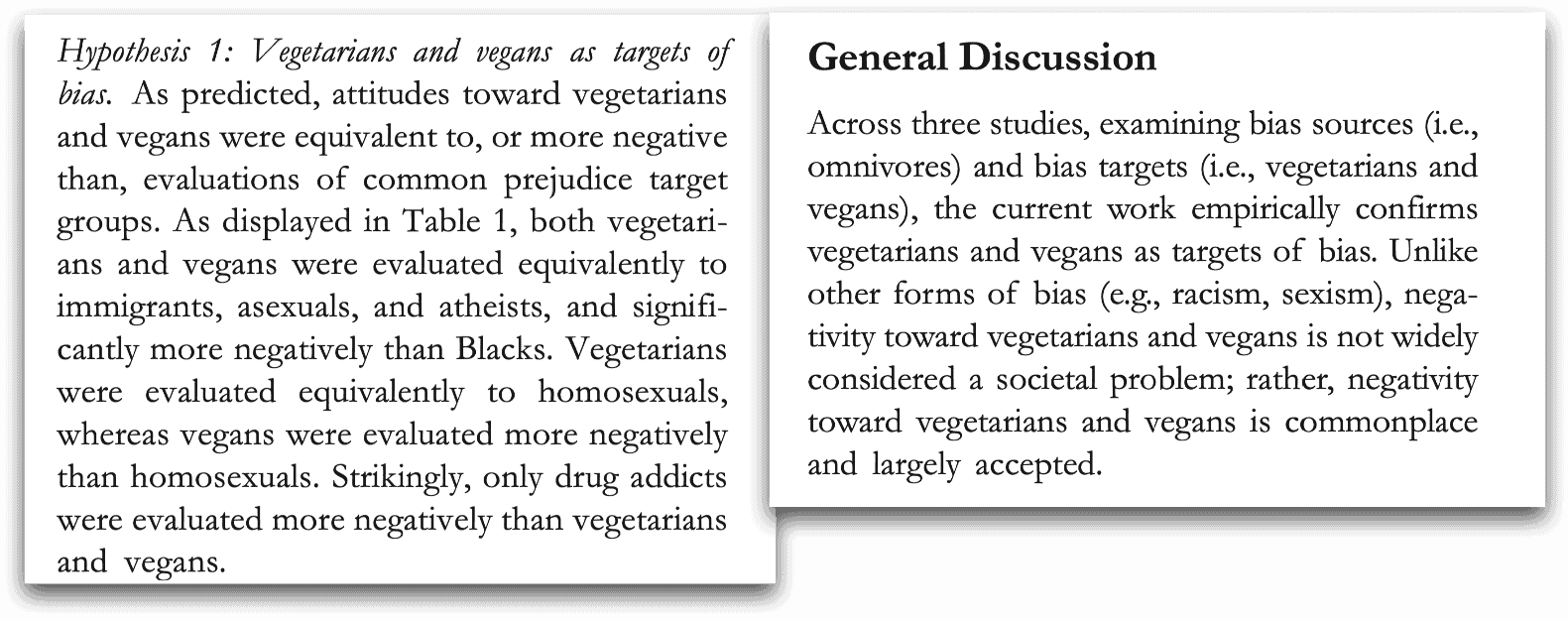
Source: MacInnis, Cara C., and Gordon Hodson. “It Ain’t Easy Eating Greens: Evidence of Bias toward Vegetarians and Vegans from Both Source and Target.”
Research shows that negativity toward vegans is not only widespread but also “largely accepted” and not seen as a societal problem, unlike other forms of bias.2 So, while vegans face bias and even outright hate like other stigmatized groups, their experience is compounded by the fact that hating on vegans is generally acceptable—even socially encouraged.3
Documentary filmmaker Kelly Guerin’s experience of “coming out vegan” was so jarring that she focused her Honors Thesis in Anthropology on better understanding the source of the aggression she encountered:
“I expected my friends and family would mock me as they had done before when I became vegetarian. What I did not expect was the hostility I faced and the almost daily confrontations in which I found myself forced to engage. I was called “freak”, “naïve”, and was even told by one roommate “you should just do the world a favor and kill yourself”.
— Kelly Guerin, from her Anthropology Departmental Honors Thesis
Shockingly, an old friend who had recently turned vegan confided that he found it much harder emotionally to tell people he was a vegan than it was to come out as a homosexual in a conservative middle school. Being an anthropology major, I found these statements both disturbing and fascinating.”4
(paragraph separation added)
In my video and article “The Science of Why People Hate Vegans,” I explore what research—including Guerin’s thesis—has to say about what motivates these kinds of responses. I won’t reiterate that entire video and article here, but one of the key takeaways is that when we take the time to understand the defenses behind such negativity toward vegans, we can see that they primarily arise from a place of personal distress rather than intentional cruelty.5
Learn what’s behind vegan stigma, stereotyping, and anti-vegan bias. This article and video review the growing scientific field of study into why people hate vegans. Interestingly, the underlying drivers of anti-vegan attitudes may point more to promising commonalities than irreconcilable differences.
At the same time, understanding the source of negativity or aggression doesn’t always make being on the receiving end of it any less distressing. Nor does it make that negativity acceptable or not worth addressing.
While it’s helpful for us to lower our own defenses in order to have more effective interactions with people, it’s equally important that we validate how painful, isolating, infuriating, and challenging it can be to be openly vegan in this world.
In understanding all sides, we start to see the common threads of humanity that run throughout our discord.
Vegans Want to Be Judged for Who They Are, Not Who People Think They Are
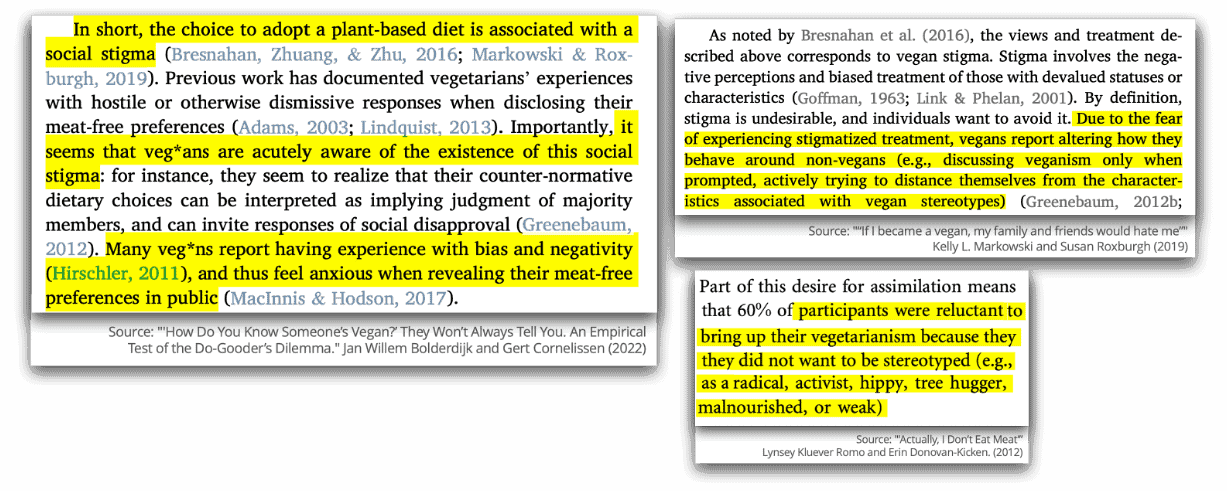
As we’ve discussed, one of the most common reasons vegans self-silence is to avoid stigma and stereotypes.6 Essentially, vegans desire what most of us desire: to be judged for who we are rather than who people think we are.
Studies show that the most prominent negative perception of vegans is that they’re judgmental, self-righteous, and arrogant.7 Some people have had interactions with vegans where they felt judged or attacked—and, let’s be honest, they very well may have been.
If they have to disclose their veganism, vegans are put in the precarious position of trying to preemptively defend themselves from the assumption they’re judgmental while not coming across as judgmental in their defense.
At the same time, research shows that even the gentlest message from a vegan is often received as aggressive,8 and even just the mention of a vegan can put people on guard.9
People often anticipate being judged by vegans,10 which raises their defenses11—and vegans anticipate being seen as judgmental, raising their defenses as well.12
Essentially, vegans can be prejudged as judgmental out of the fear of being judged.
If they have to disclose their veganism, vegans are put in the precarious position of trying to preemptively defend themselves from the assumption they’re judgmental while not coming across as judgmental in their defense.
Vegans may “soften” their veganism to avoid conflict, being stereotyped, and/or to make sure those around them don’t feel judged.13
As one study participant put it, “I have to defend myself and protect them at the same time,”14 speaking to the dual burden of “feel[ing] responsible for making others feel comfortable around her while at the same time…protecting herself from verbal attacks.”15
Many veg*ns<strong>+</strong> feel they must also “balance the tension between staying true to their…beliefs…and fitting in socially,”16 emphasizing that they are proud of who they are and what they believe in.17
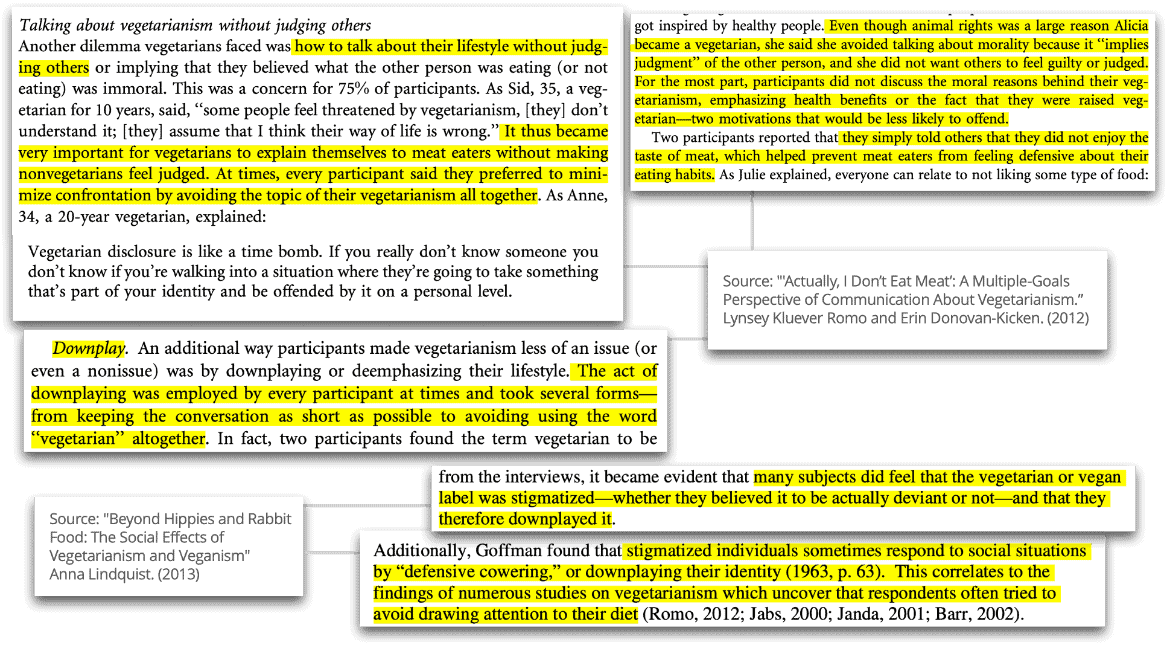
See citation #13 for quoted studies. (download image description)
For some vegans, self-silencing is not so much about fitting in socially as it is the exhaustive demands of explaining themselves,18 which we’ll explore soon in a dedicated section.
Understandably, many vegans just avoid opening the door in the first place.
Ironically, the self-silencing of vegans may actually reinforce some of the very stigmas and stereotypes they are trying to avoid. After all, no one can experience a vegan positively when they don’t know they’re vegan in the first place.
You may have had many positively delightful interactions with vegans and have absolutely no idea!
This is why some vegans take the approach of letting people get to know them first before disclosing that they’re vegan.19 But this isn’t always possible and—for some of us—it’s the people who know us best that have the most painful reactions.
Vegans Don’t Want to Be Rejected, Mocked or Dismissed
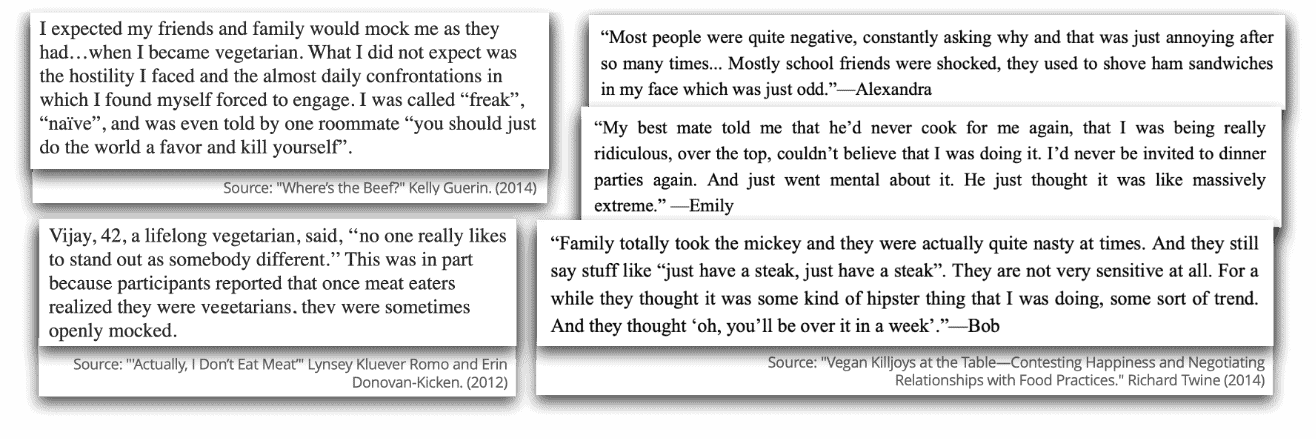
See citation #20 for quoted studies. (download image description)
Another reason vegans self-silence is due to the fear of being rejected, mocked, or dismissed. For many vegans, this fear comes from real-life painful experiences.20 Rejection is something we humans take extreme measures to avoid.
For ethically-motivated vegans, mockery & dismissal of their veganism feels not only like a rejection of who they are, but also like mockery & dismissal of the very real suffering & exploitation of other animals & humans alike, & of pressing issues like the climate crisis.
The pain of rejection is significantly magnified when it’s in response to a core aspect of our identity or a firmly held core value.21 This adds an additional layer for vegans motivated by ethical concerns for other animals, the environment, human rights, and/or societal health.
Mockery and dismissal of their veganism feels not only like a rejection of who they are, but also like mockery and dismissal of the very real suffering and exploitation of other animals and humans alike, and of pressing issues like the climate crisis.
Perhaps the most devastating magnifier of rejection is when it comes from a central figure in our life—especially from within our family of origin. Nothing hits us quite like family does.
Disclosing veganism is often unavoidable with family, and when that disclosure is met with negativity, it often leads vegans to be vigilant about not disclosing their veganism to other people,22 or even returning to eating animals.23
Being Openly Vegan Is EXHAUSTING

Now that we’ve covered some of the complex pressures behind vegan self-silencing with the sincerity and compassion they deserve, let’s take a moment to acknowledge a unifying thread running throughout them all: the fact that frankly, being openly vegan is exhausting.
This is a point that anyone can relate to on some level—vegan or not. One of the reasons people can be uncomfortable around vegans is that they feel they have to defend themselves. Well, for anyone openly vegan, this is a default expectation at all times—and, it’s just the tip of the iceberg.
Imagine having to:
- always be prepared to explain and defend every aspect of veganism
- answer for every action of every vegan as if you are somehow responsible for whatever some vegan somewhere did
- have data and statistics for every potential question
- make sure your responses don’t come across as judgmental or combative—even if you were approached with aggression, and even if you’re being actively judged and preached to while being accused of being judgmental and preachy
- make sure that your responses are suited to the exact individual and situation you’re in
- preserve the relationship if with a friend, family member, work colleague, or boss
- try not to bring in any emotional intensity from your previous experiences of being rejected, mocked, insulted, and disparaged for being vegan
- make sure not to reflect badly on all other vegans and veganism itself
- try not to betray your own convictions, the animals, the planet, or all of society
- do all of this with the knowledge that by answering questions posed to you, you may be accused of “talking about veganism all the time.”
Being openly vegan can feel like having to be a sociologist, psychologist, and walking encyclopedia with expert “skills in emotional and social negotiation”24 and infinite patience and compassion.
Honestly, sometimes you just want to be a person around other people.
While this sounds like a list of reasons you should never consider going vegan or moving away from eating animals, there’s evidence things may be changing. But before we get to that note of hope, let’s look at how vegan self-silencing—and its causes—actually harms all of us.
How Vegan Silencing Harms Us All

As I’ve hinted at throughout this video and article, the pressures motivating vegans to self-silence—and the act of self-silencing itself—have a larger-scale impact that goes beyond individual vegans.
We as a society are becoming increasingly concerned about climate change, workers’ rights, dangers to our community’s health, food insecurity, and what happens to animals in our food system. The need for a collective evolution away from eating animals is becoming more and more evident for the well-being of our planet, our communities, and of course, the animals themselves.
At the same time, we humans are social animals, and we often look to what most other people are doing to aid in our decision-making (referred to as “social proof”).25 And most people are still eating animals. So even if we feel discomfort about what animals go through to get to our plate or we’re concerned about the climate, it doesn’t look like other people are that worried.
Social proof refers to our tendency to follow the behaviors and beliefs of others when making decisions. The term was coined by psychologist Robert Cialdini, who explained the phenomenon as “one means we use to determine what is correct is to find out what other people think is correct.”26
In their paper “Harnessing Moral Psychology to Reduce Meat Consumption,” researchers Joshua May and Victor Kumar argue that social proof is a strong influence on people’s decision to continue eating animals:
“It is not just willful ignorance and rationalization that fuel tolerance of factory farms. The fact that excessive meat consumption is commonplace does not just encourage apathy: it serves as positive social proof that it is acceptable, that nothing is morally amiss. Indeed, our social context leads many of us to conclude that it is morally obligatory to eat meat, because it is an essential component of Grandma’s casserole, Mexican cuisine, or a masculine diet.”27
Essentially, because we see most people eat animals, it signals that eating animals is not only not morally problematic but completely normal and even necessary.
Researchers behind the delightfully named study “”How do you know someone’s vegan?” They won’t always tell you” propose that vegan self-silencing could reinforce this perception that not eating animals is some “niche phenomenon” only adopted by a few people on the fringe of society.28
While it may seem like a small matter for individual vegans to stay silent about their veganism, the study authors reference how “[s]eemingly trivial differences in the number of people that hold a certain personal preference within smaller groups can, in the long run, result in macro-level consequences for entire societies.”29
We often look to what most other people are doing to aid in our decision-making. And most people are still eating animals.
So even if we feel discomfort about what animals go through, or we’re concerned about the climate, it doesn’t look like other people are that worried.
From this viewpoint, “[t]he tendency to self-silence among veg*ans may prevent the onset of momentum and[…]critical mass that is needed to achieve a societal tipping point.”30
At the same time, simply asking vegans to be more vocal about their veganism places them in the Catch-22 of eliciting the very stigma we’ve covered.
At the core of it, the problem isn’t so much vegan self-silencing, but rather the reasons driving that silence. As we’ve learned in this video and article, going against social norms can have social consequences.
Research shows that the fear of receiving the same treatment as vegans prevents other people from taking steps to move away from eating animals. Steps they’d be open to exploring were it not for the potential social backlash.
This may seem like an impossible gridlock of necessary yet understandably resisted change. But there is evidence that things may be shifting.
Changing Norms: Toward a World Without “Vegans”

Researchers, advocates, political leaders, and organizations are becoming aware of the importance of institutional support for a societal evolution away from farming animals.31 A shift in our collective relationship with eating animals has to involve more than us as individuals, and there are organizations working at a systemic level in an effort that none of us have to shoulder this alone.<strong>+</strong>
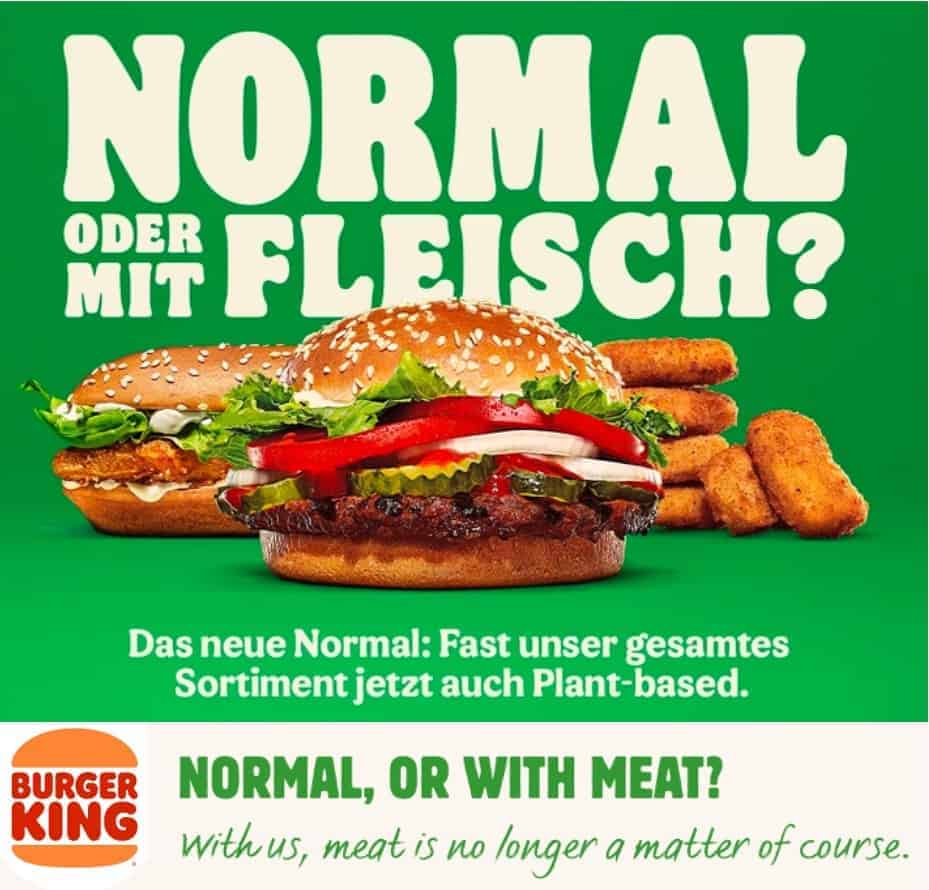
For example, some universities,32 hospitals,33 schools,34 governmental bodies,35 businesses,36 and even fast-food chains37 serve plant-based food as their default,38 with the option to “opt-in” to animal-based food.39
These programs have shown a significant decrease in animal food consumption, and changing attitudes about plant-based foods.40
They’ve found that when not eating animals is the norm rather than the deviation, people—including meat-eaters—are more likely to enjoy eating plant-based meals.41
In essence, rather than moving towards a world where everyone is vegan, we need to move to a world without “vegans” at all—where not eating animals is simply our default. Where we can all collectively act on our shared values without fear of going it alone.
On an individual level, the less we stigmatize and stereotype vegans—or anyone’s effort to move away from eating animals—the more welcome people will feel to be open about their choices. And the more we see other people acting on the things we also care about, the more welcome we can feel to make our own changes.
Rather than moving towards a world where everyone is vegan, we need to move to a world without “vegans” at all.
A world where not eating animals is simply our default. Where we can all collectively act on our shared values without fear of going it alone.
tweet this— Emily Moran Barwick
In Closing…
I hope this article and video help to validate vegans while also offering other people an inside look at what it’s like on the other side of the stereotypes, assumptions, and stigmas. And how these biases impact our greater society and collective interests.
I would love to hear your thoughts on all we covered in the comments!
To stay in the loop about new Bite Size Vegan content and updates, please sign up for the newsletter or follow the Telegram channel for the most reliable notifications.
To support educational content like this, please consider making a donation. Now go live vegan, and I’ll see you soon.
— Emily Moran Barwick
> The Better Food Foundation
> Greener by Default (from BFF)
> Forward Food
> Pro-Animal Future (pilot program based on Pax Fauna’s research)
The post Why Vegans WON’T Tell You They’re Vegan: The Other Side of Vegan Stigma appeared first on Bite Size Vegan.
